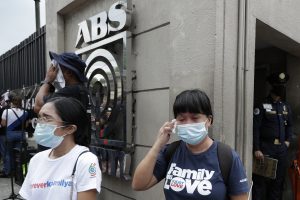Philippine lawmakers voted Friday to reject the license renewal of the country’s largest TV network, shutting down a major news provider that had been repeatedly threatened by the president over its critical coverage.
The House of Representatives’ Committee on Franchises voted 70-11 to reject a new 25-year license for ABS-CBN Corp. The National Telecommunications Commission had ordered the broadcaster to shut down in May after its old franchise expired. It halted broadcasting then, but the vote takes it off the air permanently.
Only the House of Representatives, which is dominated overwhelmingly by President Rodrigo Duterte’s allies, can grant or revoke such a franchise and the chance of any reversal of Friday’s ruling is extremely low, lawmakers said.
The network, which used to be viewed daily on free channels by millions of Filipinos, has been able to continue broadcasting some of its TV and radio news programs over paid cable channels with only a small fraction of its former massive viewership.
“We are deeply hurt,” ABS-CBN President and CEO Carlo Katigbak said, but suggested the company will try to find other ways to return to business.
“Together with our employees and our audiences all over the world, we share in your sadness over this setback,” Katigbak said. “We look forward to the day when we can again reunite under our broadcast.”
Duterte and his allies had questioned the network’s compliance with the law and the terms of its franchise. The company steadfastly denied any wrongdoing in a month of televised House hearings.
International media watchdogs condemned the closure of ABS-CBN, which was founded in 1953, as a major blow to press freedom.
Human Rights Watch said the lawmakers’ vote was “a grievous assault on press freedom in the country” and the greatest blow to media freedom caused by any government act since late dictator Ferdinand Marcos shut the broadcasting giant and other media outlets after declaring martial law in 1972.
“This move solidifies the tyranny of President Rodrigo Duterte,” said Phil Robertson, the deputy Asia director of the U.S.-based rights group.
Reflecting the extent of unease over the network’s shutdown, both the opposition and several key Duterte allies questioned efforts to close it. Concerns have also been raised by a diverse range of groups, including top business executives, left-wing activists, and Catholic Church officials.
ABS-CBN has more than 11,000 news and production personnel nationwide. Aside from reporting on the coronavirus, which has infected more than 50,000 people and killed 1,314 in the Philippines, it has provided food and medical aid to more than 2 million people, company officials said.
Media watchdogs accuse Duterte and his government of muzzling independent media such as ABS-CBN that have reported critically on issues including his anti-drugs crackdown, which has left thousands of mostly poor drug suspects dead. Duterte has accused the network of not airing his paid campaign ads and favoring a rival candidate in the 2016 election, allegations the company denied.
Presidential spokesman Harry Roque said Duterte took a neutral position on ABS-CBN’s franchise renewal and left it to Congress to decide. “Much as we want to work with the aforesaid media network, we have to abide by the resolution,” Roque said.
But ahead of the franchise expiration, the government’s solicitor-general, Jose Calida, asked the Supreme Court in February to revoke the franchises of ABS-CBN and a subsidiary in a separate attempt to shut the company for allegedly abusing its franchises and violating a constitutional prohibition on foreign investment in Philippine media.
ABS-CBN denied the allegations. The high court eventually dismissed the petition.
By Jim Gomez for the Associated Press
Associated Press journalists Aaron Favila in Manila, Philippines, and Kiko Rosario in Bangkok contributed to this report.

































